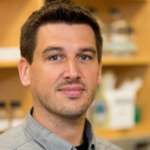Molecular Metabolism Faculty
 Sudha Biddinger
Sudha Biddinger
Associate Professor of Pediatrics
Children’s Hospital of Boston
Harvard Medical School
Associate Professor
Department of Molecular Metabolism
The mission of the Biddinger Laboratory is to define the molecular chain of events that link obesity, cardiovascular disease, fatty liver disease, and gallstones, leading to more effective prevention and treatment of these disorders.

Nika Danial
Associate Professor of Medicine, Harvard Medical School
Associate Professor of Cancer Biology, Dana-Farber Cancer Institute
Associate Professor in the Department of Molecular Metabolism
The Danial Lab focuses on molecular mechanisms and biologic consequences of cellular fuel choices. Different cell states have distinct anabolic and catabolic needs that are fulfilled by processing specific metabolic substrates.
 Gökhan S. Hotamışlıgil
Gökhan S. Hotamışlıgil
James Stevens Simmons Professor of Genetics and Metabolism
Director, Sabri Ülker Center for Nutrient, Genetic and Metabolic Research
Faculty Affiliate in the Department of Nutrition
Associate Member, Broad Institute Harvard/MIT, Harvard Stem Cell Institute
The Hotamışlıgil Lab at the Sabri Ülker Center studies innate adaptive pathways involved in metabolic health and diseases such as obesity, diabetes, and cardiovascular disease. For the past 25 years, our lab has made important contributions to the burgeoning field of “immunometabolism” or “metaflammation” studying the interactions between metabolic and immune responses as critical drivers of numerous chronic diseases. In the last decade, we have approached immunometabolism in these two paths: organelle homeostasis and lipid metabolism. Using biochemical, genetic, and physiological studies, we aim to find novel pathways and preventive, therapeutic solutions to today’s greatest threats to global human health.
 Sheng (Tony) Hui
Sheng (Tony) Hui
Assistant Professor of Molecular Metabolism
How do individual organs coordinate their metabolism to achieve the overall energy balance of the body? Why can this balance be disrupted by certain perturbations, exhibiting as metabolic diseases (e.g., high-fat diet inducing obesity and cancer-causing cachexia)? What manipulations can we do to restore the balance thus reversing and preventing the diseases? To answer these questions, the Hui lab takes the approach of in vivo flux quantification by integrating animal experiments, mass spectrometry, and quantitative modeling. Fluxes are the most fundamental functional property of metabolism. Their systematic quantitation holds the potential to reveal governing principles and regulatory mechanisms of energy metabolism. Our long-term goal is to develop treatment strategies for diseases with energy imbalance including obesity and cachexia.
 Nora Kory
Nora Kory
Assistant Professor of Molecular Metabolism
The Kory Lab will be studying spatial organization and regulation of metabolism, mitochondrial transport, and metabolism. They are going to research the basics of how mitochondria bring in and export all the metabolites that they generate for the cell.
 William Mair
William Mair
Professor of Molecular Metabolism
The Mair Lab studies the basic biology of the aging process, driven by the central question: Why are we more likely to get chronic diseases when we are old than when we are young? What goes wrong in cells and tissues to increase overall disease risk, and is this decline inevitable, or can we reverse it to bring healthy years to the elderly?
 Brendan D. Manning
Brendan D. Manning
Professor of Molecular Metabolism & Acting Chair, Department of Molecular Metabolism
Affiliate Professor of Cell Biology, Harvard Medical School
Member of the Dana Farber/Harvard Cancer Center
The Manning lab investigates the regulation and function of the PI3K-mTOR signaling network under physiological and pathological settings. Our lab employs hypothesis-driven approaches utilizing genetics, biochemistry, cell biology, and animal models combined with unbiased systems-level tools like genomics, proteomics, metabolomics, and bioinformatics. Our premise is that delineating the complex circuitry of signaling networks within cells will shed light on how best to directly stimulate or inhibit these pathways in order to prevent or treat human diseases like cancer and Type II diabetes.
 Jean Schaffer
Jean Schaffer
Senior Investigator and Associate Research Director, Joslin Diabetes Center Professor of Medicine, Harvard Medical School
Professor in Molecular Metabolism
The Schaffer Lab uses genetic, biochemical, cell biological, and physiological approaches to study mechanisms through which metabolic stress leads to cell dysfunction and cell death. A major area of focus is the lipotoxicity that results from high circulating free fatty acids and triglycerides, metabolic abnormalities that are common in type 2 diabetes and that contribute to cardiac and hepatic complications.
Jessalyn Ubellacker
Assistant Professor of Molecular Metabolism
The Ubellacker Lab leverages metabolic vulnerabilities in metastasizing cells to target and treat cancer, with a focus on exploiting the lipidomic dependencies of cancer cells in the lymphatic niche. We are working to discover mechanisms that explain how lipid availability in the tumor microenvironment promotes cancer cell dissemination, colonization at distant organs, and the awakening of dormant cancer cells. We employ human and animal models of melanoma, breast, and prostate cancers with genomics, metabolomics, lipidomics to identify and target novel programs of lipid metabolism required for metastasis. We aspire to capitalize on these connections between cancer cells and the lipid microenvironment to reduce cancer progression, thus addressing a significant unmet clinical need for effective therapies to treat and prevent the spread of metastatic cancers.
Adjunct Faculty
 Chih-Hao Lee
Chih-Hao Lee
Adjunct Professor of Molecular Metabolism
Faculty Affiliate in the Department of Nutrition
The main research interest of the Lee Lab is to understand the bioenergetic controls of physiological processes that impact metabolic health. We use a variety of tools in molecular/cell biology, biochemistry, and metabolomics as well as mouse models of obesity and related metabolic diseases to explore these questions.
Faculty with Secondary Affiliations in Molecular Metabolism
 Wendy Garrett
Wendy Garrett
Irene Heinz Given Professor of Immunology and Infectious Diseases
The Garrett Lab studies the interplay between the gastrointestinal immune system and the gut microbiome. We explore how the gut microbiota influence both innate (myeloid cell) and adaptive (T cell) immunity, and how these processes contribute to immune homeostasis and disease.
 Quan Lu
Quan Lu
Professor of Environmental Genetics and Physiology
My research is focused on the mechanistic understanding of how the environment contributes to human health and disease. We combine the power for functional genetics and genomics, mechanistic studies, and human epidemiology to tackle important public health problems.
Faculty Emeritus

Barbara Burleigh
Professor of Immunology and Infectious Diseases
 Frank Sacks
Frank Sacks
Professor of Cardiovascular Disease Prevention and Medicine



